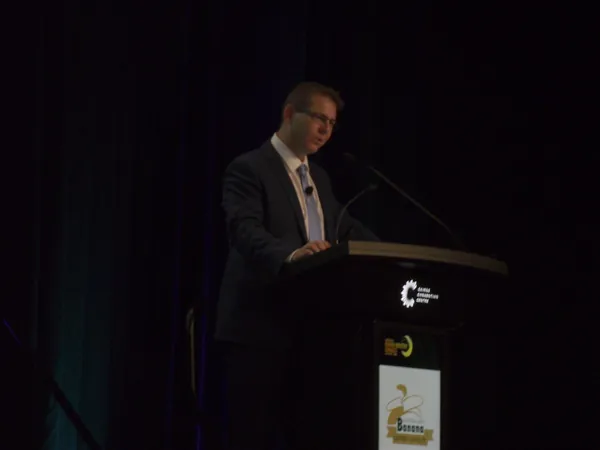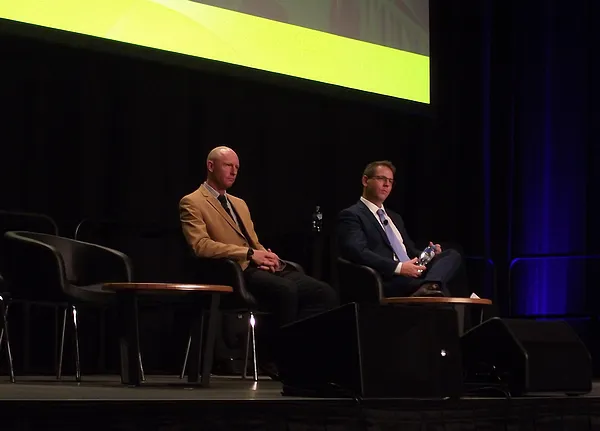A Queensland farmer and entrepreneur says the future of fruit and vegetable grower revolves around creating better value and quality rather than focusing on just increasing volumes and prices.
Trent De Paoli from De Paoli Orchards had a vision of how to secure more farm profits by doing something different rather than just pure farming – that led him down the path of value-adding. He says he has found that the most truly successful companies are those who focus on value, not price wars – because the latter are often left with a discussion of survival, not innovative thinking and evolution.
"We prefer to do one semi-trailer at $20 per kilogram per day than 20 semi-trailers at $1 per kilo per day," he said. "So, we have used this mantra in our business for many, many years. Profit cash flow and ability to re-invest is paramount; I would much rather have a one million dollar 'earnings before interest and taxes' (EBIT) on a $10million revenue than try and achieve the same amount of profit on a $100million revenue with ten times the amount of stress. It is easy to get carried away with big revenue and big numbers and lose track of what is important. Be nimble, be fast and leverage; unless you are the cheapest producer in the world don't fight on price, focus on value. Yes, you need to have critical mass, but in my view, you need to choose your battles wisely."
Mr. De Paoli's father, David, created the Austchilli group more than 20 years ago, which not only marketed fresh chillies and avocados but also started producing value-add products. AvoFresh was created in 2010, the De Paoli family saw an opportunity to provide avocado buyers with a quick, convenient, and reliable alternative. The company now has 10 farms scattered around Bundaberg and Childers and has several products such as food, beverages, and ingredients such as purees.

Personally, Trent De Paoli says he considers himself as an "over the horizon" thinker, and business is the vehicle to be able to do that. He noted that often large companies often acquire innovative companies for their ability to pivot and move quickly.
"You need to create a 'pull economy', not a 'push economy'," Mr. De Paoli said. "Unless you have Apple or Amazon's marketing budget, I find it is easier to find a problem and solve it to achieve mass adoption. It is expensive to change a consumer's habit. For many years, companies tried to sell value-added avocado products in the freezer section of the supermarket, and it's never worked, because it's a change of habit. People don't go to the freezer to buy avocado. The problem that I solved with AvoFresh was how to make avocado reliable and convenient, with all the fresh credentials, and take away the fear from the poor experience with fresh avocado. Since we launched, it has been incremental to the avocado industry. I have found that it is easier to solve problems for the consumer than change their habits."
He added that businesses need to "act local, but think global" because they are all connected to the rest of the world, no matter what sector they are in; therefore no one is insulated. Mr. De Paoli says politics, share prices, wars, food shortages, and cybersecurity threats all have an impact on farms and keeping that in mind will help risk manage and future-proof the industry.
"The Global Financial Crisis (2007–2008) personally brought us greater opportunities than we had in the previous 10 years – and COVID-19 will do the same," he said. "It purely becomes a wide-lens approach to business strategy and adopting a global-thinking mindset in business planning. It is easy to fall into the trap of focusing on just our farms, head down, and customers in Sydney and Melbourne. The reality is we are all connected to the rest of the world. Also, successful businesses of the future need to disrupt or you will be disrupted. That way we get to set the tone for others to follow, by the time that your competitors catch up, you have already moved on to the next product or service that eliminates the competition. Never take your customer for granted and always find a way to deliver value to their business."

Brand loyalty is hard to establish, according to Mr. De Paoli, who says it is important to focus on a product's unique selling properties and excitement. Once a business has established a relationship with its clients, it becomes a closed-loop circular economy, and the De Paoli Orchards director is quick to remind that business is a marathon, not a sprint.
"The adoption and uptake of something unique is a shorter road to financial reward, rather than just being another 'me too'," Mr. De Paoli said. "Value is always in the eye of the beholder. I don't like the word supply chain – because our focus needs to be solely on the customer – the word I prefer is 'demand chain'. The value proposition is perceived at the point of purchase and we have around three seconds to convince the customer that they are getting value. In export, you really need to do research in that country, rather than just do a parachute drop and hope it works. Rarely do we see unicorns in the fresh produce industry. So, look where the future is going, not where it is today; if you don't reinvent and grow within your business, you are standing still and by default going backwards because your competitors are forging ahead."
He also believes that embracing technology is yesterday's discussion and we are now living in a highly connected world and technology is the fundamental basis for survival. Innovatively advanced technology adoption is where companies will succeed.
"Advanced technologies throughout the whole demand chain is imperative to stay ahead of the curve, move past survival and into opportunity," Mr. De Paoli explained. "Those companies who adopt beneficial technology for their business will provide a high degree of resilience, efficiency and opportunity. Those that don't, look what happened to the typewriter. Artificial technology (AI) will change the world. It is already being developed rapidly. We will be able to design and go to market with a greater chance of consumer uptake of new products, so AI will be responsible for many changes in horticulture in coming years."
Mr. De Paoli was a Nuffield Scholar in 2013 and recently presented at the Australian Banana Congress in Cairns.
